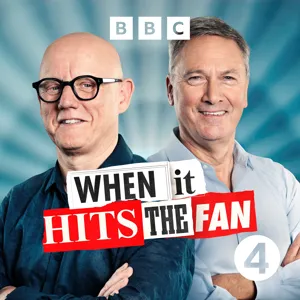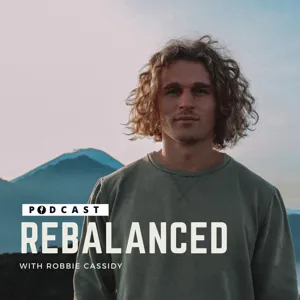Podcast Summary
Discussing the Impact of Septoplasty and Being a Doctor in 2023: Dr. Seth shares his experience on the life-changing effects of septoplasty for mouth breathers and discusses the unique challenges of being a doctor in today's world.
Becoming able to breathe through your nose after a septoplasty procedure can significantly change a mouth breather's life, as shared by Dr. Rahul Seth, a skilled surgeon who performs over a thousand of these procedures. However, the conversation went beyond the procedure as they discussed the challenges of being a doctor in 2023. Dr. Seth, a 43-year-old accomplished surgeon, confessed to being nervous before a podcast interview, highlighting the difference between saving lives in the operating room and in a podcast setting. The Marine Corps Scholarship Foundation awards over $10,000,000 in scholarships annually to nearly 3,000 applicants, making it an excellent resource for those who qualify. Overall, the episode offers valuable insights into the world of medicine and the transformative impact of a simple breathing procedure.
Waiting Decades for Nose Surgery: A Regretful Decision: Many delay nose surgery due to lack of awareness or acceptance, leading to unnecessary discomfort and expense for those with significant breathing issues.
Many people put off getting nose surgery despite the significant impact it can have on their quality of life. This is often due to a lack of realization or understanding of the potential benefits. The patient in this conversation shared his experience of waiting decades to get his deviated septum addressed, despite dealing with breathing issues and discomfort for years. He attributed his delay to a lack of awareness and acceptance of the problem, as well as the inconvenience and cost of solutions like nose strips. Studies suggest that a large percentage of adults have a deviated septum, but not all require surgery. However, for those whose breathing issues significantly impact their daily life, the wait can lead to unnecessary discomfort and expense. The patient expressed regret for waiting so long and encouraged others to consider addressing their own breathing issues sooner rather than later.
Empowering patients with improved functionality through surgery: Medical professionals should set realistic expectations by describing potential challenges of surgery, addressing individual needs, and leading to significant improvements in functionality.
Even the most routine and natural processes in our lives, like breathing, can be improved, but we often take them for granted and accept inconveniences as the norm. As a surgeon, I am empowered to make a significant impact on people's lives by addressing these issues and enabling them to enjoy improved functionality. However, the experience of undergoing surgery, such as correcting a deviated septum, can vary greatly from person to person, with some finding it to be a horrible and miserable experience. It's important for medical professionals to set realistic expectations by describing the potential challenges in detail, rather than downplaying them. Ultimately, each person's surgery is unique, and addressing individual needs and blockages in the nose can lead to significant improvements in functionality.
The Nose: A Complex and Vital Organ: The nose warms, filters, and humidifies air, using turbinates and respiratory cycle, maintaining its health is crucial for overall respiratory system function, and free job postings on ZipRecruiter.com can help fill employment opportunities.
The human nose plays a crucial role in our respiratory system by warming, filtering, and humidifying the air we breathe. This process is facilitated by the nose's internal structures, including the turbinates, which help slow down the airflow and ensure proper filtration. The nose's ability to change size internally, a mechanism known as the respiratory cycle, is a miraculous feature that regulates airflow. It is essential to maintain the health of these structures, as any issues with the nose can impact the entire respiratory system. Additionally, opportunities for employment can be easily found and filled by posting jobs for free on ZipRecruiter.com. The nose may seem insignificant, but it is a complex and vital organ that deserves appreciation.
Corrections for crooked septum: Traditional vs Functional Septoplasty: Minor septum crookedness can be corrected with a less invasive traditional septoplasty, while major issues require a more invasive functional septorhinoplasty to rebuild the septum's structural supports.
The septum, a structure in the nose, can have crookedness that impacts breathing and may require surgical intervention in the form of a septoplasty. This procedure can be approached differently depending on the location and severity of the crookedness. For minor issues, a traditional septoplasty with less downtime can be performed by making cuts within the nose itself. However, for more structural issues, a functional septorhinoplasty may be necessary, which involves making cuts on the outer surface and rebuilding the septum's structural supports. This approach is more invasive and requires more downtime but ensures the nose remains stable. It's important to note that these procedures are complex and should be performed by experienced medical professionals.
Patient's challenging nose reconstruction journey: Patient faced prolonged bleeding, fear of splints, and discomfort during recovery, but ultimately trusted medical professionals for a successful outcome using advanced techniques.
The nose reconstruction surgery involved unexpected challenges, including the use of stitches and splints, and the patient's experience with excessive bleeding. The patient's fear of the splints and the discomfort they caused during recovery were significant. The patient's experience was compared to a horror story due to the prolonged bleeding and the difficulty in breathing. Despite the challenges, the surgeon provided reassurance and support, ultimately leading to a successful outcome. The use of advanced techniques, such as stitches and plastic splints, ensured a stable and long-lasting result. The patient's experience highlights the importance of patience and trust during the recovery process, as well as the expertise and care provided by medical professionals.
Multimodal analgesia for effective pain management: Combining different types of pain medications reduces opioid reliance, promoting quicker recovery and minimizing risks.
Effective pain management during and after surgery involves using a combination of different types of medications, known as multimodal analgesia. This approach aims to reduce the reliance on opioids, which can have negative consequences like addiction. The use of over-the-counter pain relievers like Motrin, Ibuprofen, and Tylenol is often the first line of treatment. However, in some cases, opioids like hydrocodone may be necessary to alleviate severe pain. The goal is to limit opioid use and get patients off of them as soon as possible due to the risks associated with their long-term use. The surgical procedures themselves can be demanding, requiring surgeons to maintain focus for extended periods. Their extensive training prepares them for this challenge, allowing them to enter a state of concentration that enables them to perform the surgery effectively.
Surgeon's focus and endurance during long surgeries: Surgeons' intense focus and long hours without breaks stem from personal discipline and professional training. Backup plans and partners are crucial for handling unexpected events.
The surgeon's focus and ability to endure long surgeries without breaks is a result of both personal discipline and professional training. He shares how he can concentrate intensely for extended periods, which allows him to complete surgeries in one sitting, often without eating or using the bathroom. However, as he ages, he acknowledges the need for more breaks. The surgeon also emphasizes the importance of having backup plans and partners in the medical field to handle unexpected events, such as earthquakes or patient instability. He reflects on his career and the advancements in healthcare technology, expressing curiosity about what the future holds for medicine. Despite the challenges and uncertainties, he remains dedicated to his profession and the lives he touches through surgery.
Navigating Challenges as a Doctor in High-Cost Areas: Doctors in high-cost areas face unique challenges like affordability, work-life balance, and physical/emotional demands. Building a support system, practicing self-care, and using efficient hiring tools can help.
Being a doctor, especially in high-cost areas like the Bay Area and Silicon Valley, comes with unique challenges. These challenges include affording living expenses, balancing family and patient responsibilities, and dealing with the physical and emotional demands of the job. The speaker, a doctor himself, shares how he and his wife, an ophthalmologist, have navigated these challenges by leaning on their community and family for support. He also emphasizes the importance of self-care and taking a step back when necessary. Another key takeaway is the importance of efficient hiring processes, which is where ZipRecruiter comes in. The speaker shares how ZipRecruiter's smart technology helps him reach a larger pool of qualified candidates quickly and easily, allowing him to focus on other aspects of his busy life.
The impact of a life-altering event: Seeking excellent medical care and a skilled surgeon can make all the difference in recovery. Wear protective gear to prevent accidents and appreciate the importance of skilled medical professionals.
Life-altering events can provide valuable perspective and appreciation for the people and experiences that shape our lives. The speaker, a facial plastic and reconstructive surgeon, shared his personal experience of breaking his elbow in a bike accident and the impact it had on him. He emphasized the importance of seeking excellent medical care and the profound influence of a skilled surgeon who put him back together. The incident also reminded him of the importance of wearing protective gear like helmets while riding bikes. As a surgeon, he specializes in facial reconstructions, and the conversation highlighted the importance of his work beyond just improving people's breathing. Overall, the conversation underscored the significance of gratitude, resilience, and the importance of skilled medical professionals in our lives.
Reconstructing significant areas with free flaps: Free flaps allow surgeons to restore form, function, and identity by taking a piece from one body part, giving it a new blood supply, and attaching it to the target area. Success rates have improved significantly since the post-WWII era.
Surgeons can reconstruct significant areas of the body using free flaps, which involve taking a piece from one part of the body, giving it a blood supply from another, and attaching it to the target area. For instance, a fibula bone from the lower leg can be used to reconstruct the jawbone, complete with its blood vessels being connected to spare ones in the neck. This innovative technique not only restores form and function but also a sense of identity for patients. The concept of free flaps was developed in the post-World War II era, and while early success rates were low, advancements in surgical techniques have since improved success rates to nearly 100%. Despite the initial risks, the medical field continues to push boundaries and develop new procedures to improve patients' lives.
Advancements in surgical sciences driven by less regulation, now prioritize caution with increased regulation: The next major advancement in surgery is expected to be gene therapy and precision-based genetic therapy, while AI is used in cosmetic surgery for personalized patient care, but medical education debt remains a significant challenge.
The advancement of surgical sciences in the past was driven by less regulation, leading to innovation and progress. However, with increased regulation, there is still advancement, but caution is prioritized. The next major advancement is expected to be the application of gene therapy and precision-based genetic therapy in surgery. In the field of cosmetic surgery, AI is being utilized to determine the best fit for a patient's desired features based on their facial structure. This is achieved through geometric morphometrics and 3D imaging. AI is also used for photo morphing, although not as extensively as in other applications. The cost of medical education and the resulting debt are significant challenges for many medical professionals, with the average medical school graduate leaving with over $400,000 in debt. These financial burdens, combined with the high cost of living, make entering the medical field a significant struggle. Despite these challenges, advancements in technology continue to shape the medical landscape.
The Complexity and Financial Burden of the US Healthcare System: The US healthcare system is broken, causing high costs and stress for patients and healthcare professionals, with surgery costs varying greatly based on insurance coverage and the need for providers to charge inflated prices to make up for lost revenue.
The healthcare system in the US is complex and broken, leading to high costs and stress for both patients and healthcare professionals. Surgeons, for instance, face immense pressure and stress during long hours in the operating room, while dealing with the financial burden of their education and the high costs of procedures not covered by insurance. The cost of healthcare procedures can vary greatly depending on whether they are covered by insurance or not, leading to a confusing and often unfair system. The price of procedures covered by insurance is often artificially inflated due to insurance companies only covering a percentage of the cost, forcing providers to charge higher prices to make up for the lost revenue. This leaves patients without insurance coverage paying exorbitant prices for necessary procedures. The system needs a fundamental overhaul to provide fair and affordable healthcare for all.
Assess your breathing habits for better quality of life: Consult a doctor if persistent nasal blockage affects sleep, daytime activities, or exercise. Identify underlying causes and explore non-surgical options like medications or breathing exercises.
Improving your breathing can significantly enhance your quality of life. If you're experiencing persistent nasal blockage and mouth breathing, the first step is to assess your breathing habits. Consider when and why your breathing is a problem, and if it's affecting your sleep, daytime activities, or exercise. If you determine that your breathing issues are impacting your life, the next step is to consult your primary care physician for a referral to an ear, nose, and throat (ENT) or otolaryngologist specialist. An ENT can help identify the underlying cause of your nasal blockage, which may include a deviated septum, turbinate hypertrophy, polyps, or sinusitis. Depending on the diagnosis, medications or surgery may be recommended. It's essential to understand that not everyone with nasal blockage requires surgery. In some cases, medications or breathing exercises may be sufficient. The book "Breath" by James Nestor and his podcast with the speaker provide valuable information on the importance of breathing and can help guide you on your journey to better breathing. Remember, improving your breathing is not just a fashionable trend but a meaningful investment in your overall health and well-being.
Discussing Nasal Obstruction and Personal Growth with Dr. John J. Orlando and Kat from Ritual: Dr. Orlando emphasized the importance of personal growth and reaching one's full potential through medical interventions like nasal obstruction treatments. Kat highlighted the significance of transparency in the supplement industry for consumer trust.
The human experience encompasses a wide range of challenges and triumphs, and the work of medical professionals, like plastic surgeons, plays a crucial role in improving people's lives. Dr. John J. Orlando, a respected plastic surgeon based in the Bay Area, shared his insights on nasal obstruction and the transformative impact of his work. He emphasized the importance of reaching one's full potential, both personally and professionally. The conversation also touched upon the mystery and nobility of medical professions and the importance of transparency in the supplement industry, as highlighted by Kat, the founder of Ritual, a company committed to traceability in supplements. Overall, the discussion underscored the significance of dedication, resilience, and the pursuit of betterment in various aspects of life.




 Wayne Jenkins, MD, is the chief medical officer at Centivo. He is an accomplished physician and executive with a proven track record of patient-centered, revenue-driven results. Over the course of his career, he has consistently transformed large, complex healthcare systems into market leaders that deliver quality and value in a dynamically changing environment.
Wayne Jenkins, MD, is the chief medical officer at Centivo. He is an accomplished physician and executive with a proven track record of patient-centered, revenue-driven results. Over the course of his career, he has consistently transformed large, complex healthcare systems into market leaders that deliver quality and value in a dynamically changing environment.

